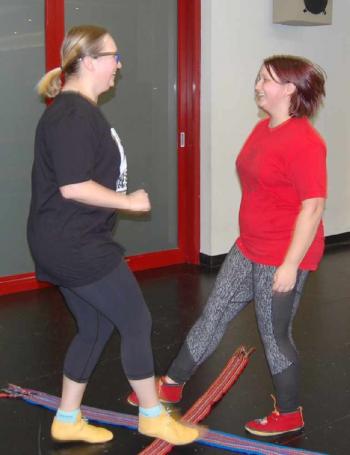Image Caption
By Shari Narine
Windspeaker.com Contributor
EDMONTON
It took Aurora Leddy a while to find her way back to her Métis heritage, but for the past year she has embraced it to the point that she jigs almost every day.
“I fell in love with it; just the energy. I felt I was missing something when I left high school and the music program. And being able to dance again kind of brought that back into my life,” said Leddy, 20, who leads Métis jigging on Monday nights at T.D. Baker School in Millwoods in southeastern Edmonton.
She was drawn back to the dance through her mother and sister, who “dragged” her along with them as they took jigging at MacEwan University. Leddy had jigged when she was little.
Now, on top of the once-a-week evening jigging, she visits schools to teach her traditional dance. She is part of a group of University of Alberta students, that jigs and are contacted on a regular basis to spend afternoons in schools. Leddy also does performances and a handful of competitions.
“I think it’s really important to share my culture and the joy that dancing brings,” she said. The Monday night jigging draws anywhere from three to 10 participants.
Leddy is completing her second year of a Bachelor of Science degree at MacEwan University. Next year, she plans to shake her education plans up a little and switch to anthropology with the hope to do osteology in a forensic setting.
She’ll complete her undergraduate degree at MacEwan and then switch to UAlberta or head east to the University of Toronto.
Edmonton is fast on its way to becoming the Canadian urban centre with the highest Indigenous population. Most of the programming geared toward that demographic is concentrated downtown and further north.
The city’s south side has an ever increasing Indigenous population and that was one reason why Leddy decided to offer jigging in the part of the city she grew up in.
“There’s a lot of Aboriginal people here who can benefit from it. I wanted to give back,” she said.
Leddy does beading and now is looking at how to hand-tan leather so she can make her own gear for jigging. She is proud of her heritage.
It’s a pride Aurora’s mother Krista admits she herself struggled with as a youth, growing up in Millwoods where she was one of a few Métis people.
But that doesn’t mean she didn’t grow up in her culture. Her Métis roots are in the Lac Ste. Anne and St. Albert areas. Krista’s grandmother was the well know Elder Delia Gray, often referred to as the “Matriarch of the Métis Nation of Alberta.” The Métis Nation of Alberta’s provincial office is housed in the Delia Gray Building.
“Listening to stories, going with my grandmother to events, meeting people. Kokum was a knowledge keeper as well as an Elder so there was a lot of stories,” said Krista. “But unfortunately, because I was young and foolish, I didn’t always listen very well.”
For the past nine years, Krista has been employed by Edmonton Public Schools and has had opportunity to work with Indigenous students. But as a First Nations, Métis, and Inuit liaison, working out of J. Percy Page high school in Millwoods, she now does that work in an official capacity.
And, she admits, somebody connecting with her in that manner when she was growing up would have made a difference.
“I remember being a teenager and told to keep (my Métis heritage) to myself. Whereas now, I work in a school in this position, supporting Indigenous students and my daughters can be out there and teaching and learning, can openly wear clothing that can demonstrate who they area,” she said.
Krista helps with the jigging on Monday evenings. On Wednesday evenings she teams up with Lacey McNally, the Aboriginal Success coach through the Way-In project, to run a traditional arts regalia class at Edith Rogers School, also in Millwoods.
Elder Phillip Campiou provides guidance for the regalia, while Krista works with the beading. About 20 people come out regularly and they are of all ages, Indigenous and non-Indigenous.
“It’s a wonderful opportunity for building bridges and understanding,” said Krista, who is part of a collective that hosts monthly family nights that offer dinners and cultural events.
There is a growing pride in being Indigenous, she says, brought about by a different political and social climate.
And for Krista it’s about maturity and comfort.
“As an adult, you kind of figure who you are and what you want to show the world and you just become more confident in yourself. This is who I am and I’m not going to apologize for that. I have every right to be here. This is my land too. This is my ancestral land, too,” she said.

